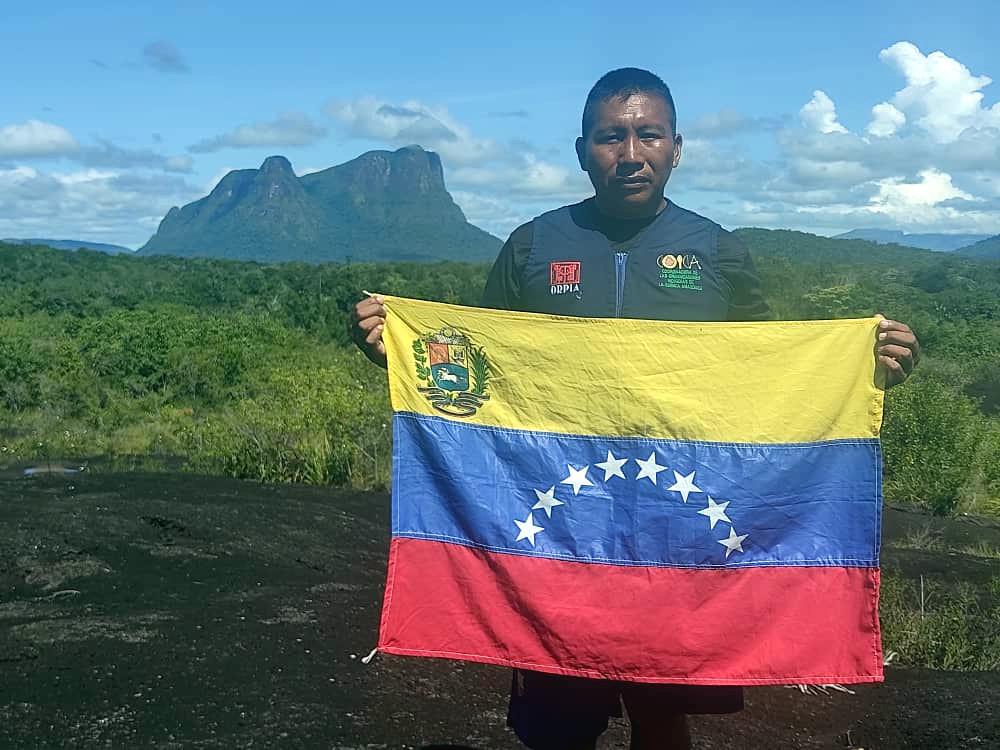
Virgilio Trujillo Arana, an Indigenous Uwottuja defender of the Venezuelan Amazon. ¡Presente!
Venezuela Indigenous Leader’s Killing Terrifies Defenders of Amazon Lands
Mie Hoejris Dahl / Guardian UK
(July 9, 2022) — Virgilio Trujillo Arana knew that he was risking his life by defending the Amazon lands on which his Indigenous Uwottuja community had lived for centuries.
“Whatever happens, happens,” he said, in a video recorded before his death. “[But] without land, we disappear. That’s why we defend our territories.”
Trujillo, 38, served as the coordinator of the Indigenous Territorial Guard in the Autana municipality, in the state of Amazonas in southern Venezuela. He was also the founder of Ayose Huyunami, a unit defending Indigenous lands from criminal groups and illegal mining.
On Thursday, he was shot dead in the city of Puerto Ayacucho by a gunman who opened fire in broad daylight.
His murder has left his family and the Uwottuja community fearful and infuriated. Many of those who knew him asked not to be named out of concern for their own safety.
“It’s the first time I have suffered such a great loss … [Trujillo] – may he rest in peace – was the one who took the first step to defend our home,” said a family member.
Trujillo’s murder has been perceived by human rights defenders as an attack not just on one individual, but against an entire community and its efforts to protect a way of life.
On the night of his killing, other members of the Indigenous guard received death threats, and one member said that the murder had had a catastrophic impact on morale.
“Right now, I’m devastated and I feel incapable of fighting,” the guard said. “We’ve seen the price for this fight, and it’s very painful. Time may be running out for us. As frontline defenders, we’re all being threatened.”
But Trujillo and the Indigenous guards’ mission seems more important than ever.

In 2016 Venezuela’s leader, Nicolás Maduro, designated an area larger than Portugal as a strategic development zone for the exploitation of gold and other precious minerals.
Amazonas state is not part of this area, known as the Orinoco Mining Arc, and mining has been prohibited there since 1989. But the prohibition has not stopped mafia gangs and Colombian rebel groups from digging gold in the jungle – bringing violence, crime and environmental destruction with them.
Trujillo’s death came amid a wave of threats and violence against rainforest defenders across the Amazon. Last month, the Brazilian Indigenous expert Bruno Pereira and British journalist Dom Phillips were murdered in the Brazilian Amazon and activists have faced intimidation and violence in Ecuador, Peru and Colombia.
In Venezuela alone, 32 Indigenous and environmental leaders have been killed over the past eight years, according to the Odevida human rights organization.
“Virgilio Trujillo was not any Indigenous man. He was the defender of the Amazon,” said Armando Obdola, director of the Indigenous organization Kapé Kapé.
His death sits at the centre of a network of interlinked crises, said Tamara Taraciuk, acting director of Human Rights Watch’s Americas division.
“Virgilio’s death exposes some of the most difficult human rights challenges facing Venezuela today: the brutal control that armed groups exercise over illegal mining in the country; the struggle of Indigenous groups, who have been largely forgotten by authorities; and the uselessness of Venezuela’s judiciary to investigate abuses independently and hold those responsible accountable,” she said.
After the murder and the death threats, most members of the Indigenous guard were too afraid to show up at Trujillo’s funeral – and they have all avoided speaking out publicly about what happened.

An illegal mine in Venezuelan Amazon.
“We’re entering a situation of passivity and fear,” says Obdola. “But this should be a moment of awakening.”
Trujillo’s family has called for a full investigation, but some blame Venezuelan authorities for his death. Virgilio had previously worked alongside units of the country’s army to protect Indigenous lands. After a string of death threats, he had applied to the interior ministry for protective measures more than a year ago, but his requests went unanswered.
“Unfortunately, the government system and these armed groups formed an alliance,” said a family member. “Instead of protecting the land, they engaged in corruption and smuggling.”
Posted in accordance with Title 17, Section 107, US Code, for noncommercial, educational purposes.